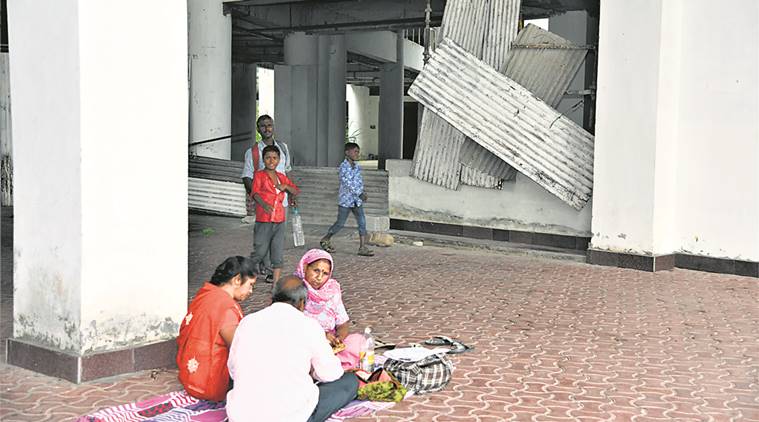IN 2015, 2,748 persons died in accidents in Uttarakhand, marking a 121 per cent rise from the previous year and the highest annual spike across all states, according to the National Crime Records Bureau (NCRB). But, at the same time, the state’s premier healthcare brand did not have a fully operational emergency and trauma centre to handle these cases.
Barely three months ago, and four years after AIIMS Rishikesh started functioning, an emergency and trauma centre finally became operational. But it is still without emergency medical officers, a dedicated Intensive Care Unit (ICU), nurses and much of the equipment needed, such as a dedicated gas pipeline for operating ventilators.

One of the six new functional AIIMS set up by the government on the lines of the premier institute in Delhi, the lack of adequate emergency and trauma care is just one of the glaring holes at AIIMS Rishikesh. The Indian Express also came across a severe shortfall in beds for patients, qualified faculty, and essential equipment and staff.
Story continues below this ad
For instance, doctors admit that the new emergency centre, which became operational on April 21, caters mostly to Char Dham pilgrims visiting Kedarnath, Badrinath, Gangotri and Yamunotri. Even then, they say, very few patients visit the emergency facility here because they are aware of the “lack of facilities”. Read: This AIIMS has no emergency services, blood bank, mortuary or cardiac OPD. Click here.
Records accessed by The Indian Express further show that 3,776 non-faculty posts are vacant at AIIMS Rishikesh, and 196 of the 305 faculty posts are yet to be filled. Besides, nursing staff and technicians are currently being sourced on contractual basis. There’s more:
4-month wait for OTs
The new emergency and trauma centre has only 50 beds, less than half the allotted capacity of 120. And, with only six operation theatres (OTs), appointments in departments such as gynaecology, orthopaedics, ENT, ophthalmology, general surgery and neurosurgery, have waiting lists of up to three-four months.
“Initially, we received many emergency cases from remote, hilly areas, but without an emergency centre, we referred them to the state hospital in Rishikesh, or to the Himalayan Institute of Medical Sciences in Dehradun,” says an official in AIIMS Rishikesh’s administrative department. “Work on the construction of 24 modular operation theatres will begin soon,” says Dr S K Mittal, the acting medical superintendent.
Shortage of beds at IPD
Story continues below this ad
The in-patient department (IPD) started functioning in January 2014 but only 416 of the total capacity of 960 beds are currently operational. Also read: This is also AIIMS: No doctors, no faculty, a crowded OPD shuts. Click here.
For instance, the institute has a fully functional psychiatry department but without beds to admit cases of severe mental disorders. At the other end, is the ENT department, which has 24 beds that are occupied round the clock. “We have sent a proposal to the director for more beds,” says a professor in the ENT department.
“We don’t have enough manpower — skilled or unskilled — to run the hospital at even 50 per cent capacity. The emergency centre cannot be sustained if this lack of manpower continues,” says a doctor at the neurosurgery department.
ICU not fully operational
The institute has an ICU but without a ventilator service, which practically renders the facility non-functional. “We don’t have a gas pipeline for the ventilators to be operational. We are using oxygen cylinders, in some cases, as a temporary arrangement. ICU functions are currently limited to the 12 beds installed for pre and post-operation treatment,” says the administration official.
Story continues below this ad
Says a consultant at the gynaecology department, “Without ventilators, we refer many cases of high-risk pregnancies to other hospitals, including PGI, Chandigarh, and the Himalayan Institute.” Even super speciality wings, where dedicated ICU services are mandatory, they use surgical ICUs, says a doctor.
Key depts hobbled
Among the key super speciality departments, surgical gastroenterology, neurology, endocrinology and metabolism exist only on paper, but don’t function. The nephrology department does not have a nephrologist or dialysis machines.
In the absence of radiotherapy facility and a full-fledged cardiac care unit (CCU), the cardiology department, which has only one assistant professor, is on the back foot too. “The High Energy Linear Accelerator (HELA), used for cancer patients after surgery, is yet to be acquired by the radiation oncology department,” admits the administration official.
Over-burdened staff
For a snapshot of the staff crisis at AIIMS Rishikesh, visit the anaesthesiology department, started in 2013: only three senior resident doctors to train 13 junior resident doctors. Read: Will take time for AIIMS Bhopal to become a brand: Prof Nitin Madhusudan Nagarkar. Click here.
Story continues below this ad
“I have to attend to patients and teach students in the college. It becomes so hectic that my shift stretches from 8 am to 12 pm. There has been no recruitment in the department for the last two years,” says a senior resident doctor.
The neurosurgery department, with eight sanctioned posts of neurosurgeons, has only two. “Since it is the Char Dham season, work pressure has increased. We are working beyond our capacity,” says a neurosurgeon.
PG courses without profs
The institute started post-graduate courses in 2016, but many are being run without a professor and with assistant professors who have a teaching experience of just three-five years. And this, when one of the prerequisites for running a PG course is at least one professor, with 13 years of experience.
For instance, the PG course run by the department of medicine, which runs one of the institute’s busiest OPDs, does not have a professor. The dermatology PG course, too, does not have a professor.
Story continues below this ad
“Last year, we had only 20 PG seats because we are not equipped. This year, we have 116 PG seats, but many are in departments that don’t have professors to head them,” says a professor at the medical college.
Students complain of “inadequate” clinical training. “The biggest issue is the lack of a fully functional emergency and trauma centre. Not much can be taught when we cannot treat critical cases,” says a PG student.

 Outside the new trauma centre at AIIMS Rishikesh. Express photo by Kavita Upadhyay
Outside the new trauma centre at AIIMS Rishikesh. Express photo by Kavita Upadhyay






